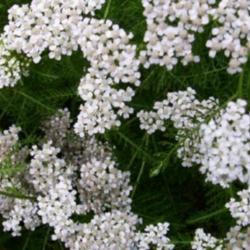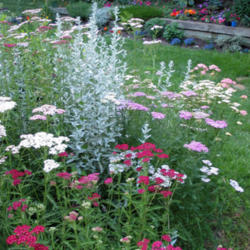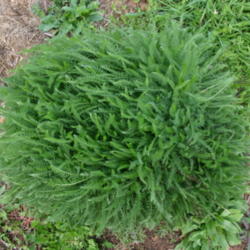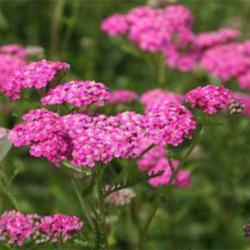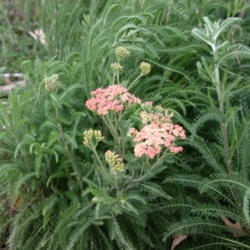There was magic, she said, in the plants we gathered from the mountain. Magic plants had three reasons for living: They gave us food, they gave us medicine, and they gave us beauty. She said yarrow was truly magic because it was also a plant that could live with very little water. To me, the very best part about yarrow was that it was so old it had a story to tell. That made it even more magical. I loved Aunt Bett's stories.
The sun was setting on a warm summer day, turning everything golden and shimmery. The shadows were long and I watched Aunt Bett as she came toward me, then stopped and leaned to whisper in my ear: "T'morrow 'twill be a good day for blackberries. I'll bring th' buckets, you bring yore ribbons and we'll gather the yarra right early."
I smiled at her twinkling blue eyes that I knew mirrored my own. The yarra and the ribbons were a secret we shared, one of many secrets best kept silent. Morning came and with the heat of the rising sun, I dressed quickly in overalls with pockets and a long sleeved shirt, knowing I could always cuff those overalls and roll the shirtsleeves up if the heat shimmered its way to our side of the mountain. In my pockets I stuffed several old well worn ribbons that had kept my hair from tangling with limbs and spider webs and assorted flying things that lived with us in our mountains.
I waved to my mother as I ran out the door. "Aunt Bett and me, we're goin' blackberry pickin', Mom, see ya!" And I was headed down the holler at a run, rolling up my sleeves as I went. I heard my mother's voice, loud, then fading as I ran: "Don't you come home with your arms and legs all scratched and blood drippin', you hear me?" Of course I heard her, she said the very same thing every time we went blackberry pickin'. I ran a little faster. I had to make sure Aunt Bett had the yarrow.
Sure enough, there she was, right in the middle of the yarrow patch. I could always tell yarrow from the other plants, even from a distance. Its silvery gray foliage looked like smoky lace against the dark green of other plants. And even when it bloomed, its clusters of a thousand tiny flowers looked like powder puffs. It was such a pretty plant, looking like nothing else that grew in our mountains.
"Aunt Bett, Aunt Bett, I'm here," I yelled. "Can I help you pick th' yarra?"
"I have th' yarra, Honey. Did ya bring the ribbons?" Her voice sounded like tinkling bells in the early morning air. I grabbed the ribbons from my pocket and waved them so she could see. We were ready to climb the mountain to find the blackberry patch.
I think I should tell you right now of the connection between yarrow and blackberries, lest you be thinking I had my magic plants mixed with my berries. I'll tell you about yarrow, just as Aunt Bett told me.
Yarrow,
Achillea millefolium, grew thousands of years ago and its name came from the Greek hero, Achilles. Now Achilles had an army of many thousands of soldiers who fought the battle of the Trojan War years and years ago. The soldiers were severely wounded, but hardly any of them died because Achilles carried a good supply of yarrow with him. Whenever a soldier was wounded, Achilles covered the wound with leaves from the yarrow plant and tied them in place with rags torn from his own shirts. The yarrow, being a magic plant, staunched the flow of blood and the wound healed very quickly. For those soldiers who were suffering from internal wounds, Achilles made a tea from the yarrow leaves, and the wounded man drank the tea and all internal bleeding stopped and the men were well soon enough to join the battle again. Achilles was a hero to his men and to his country, and they all credited yarrow for halting the flow of blood.
I thought that was such a beautiful story. Little girls always love to hear of heroes, and I was no exception. Aunt Bett used yarrow for the same purpose, to stop the flow of blood from a wound. I seemed to be a magnet for thorny plants: quince, black locust, blackberries, and roses. It didn't matter much what it was; the thorns would find me. So when we went blackberry picking, Aunt Bett was prepared to bind those scratches on my arms and legs with her "yarra," held in place, of course, by my old hair ribbons. I can only imagine what I might have looked like if I had been seen by anybody else in those mountains: Sprigs of grayish green held in place up and down my arms and legs by various colors of ragged hair ribbons. It sure beats the image of being wrapped like a little mummy in white bandages, though.
So for Aunt Bett, yarrow was a medicinal plant. She also brewed a tea from it, and early in summer when the yarrow leaves are young and tender, she said the tea was good for her rheumatism and was good for reducing fevers. I've eaten the young leaves fresh in salads and often as a flavoring in soups, so yarrow is also a food plant, though the older the plant gets, the tougher its foliage is. When it begins blooming in June and blooms all summer, there's nothing prettier than those clusters of tiny flowers, looking so much like powder puffs growing in my garden. Medicine, food, and beauty, that's all a plant needs to be magic, she said.
The yarrow that grew wild in my mountains would grow anywhere, beside dusty roads, in meadows, along the edge of rocky cliffs, and even sometimes on creek banks. It is one of those plants that grows even without water, and when drought hits western Kentucky, you can believe the yarrow in my yard keeps right on growing and blooming.
We picked several buckets full of blackberries, and of course I ate as many as I picked. And just as predicted, the thorns scratched rather wickedly and quite soon I was wearing ribbon-covered yarrow on my arms and legs. I was used to it, though, and as soon as we got to Aunt Bett's house, she carefully untied the ribbons, lifted the yarrow away, and gently wiped my arms and legs with a soft cloth dipped in the yarrow tea she had cooling on her stove. I was patted dry, and though the scratches were reddened, there was never any blood for my mother to see. I uncuffed my pants, rolled down my sleeves, and with a bucket of berries carried in each hand, I made my way back up the holler to my home and to my mom. She was delighted with the blackberries and I was happy to have blackberry cobbler for dinner.
Today, modern herbalists continue to use yarrow to help staunch the flow of blood, and as a tea to reduce fever and to reduce the discomfort of rheumatism. The young and tender leaves are great in salads, having a slightly bitter but tangy flavor, and the plant is a showpiece in any garden. I will tell you one more magical secret about yarrow, and this I know to be true. If you have a critter problem where you live, you might want to add a bunch of yarrow here and there. Rabbits and deer absolutely hate it.
